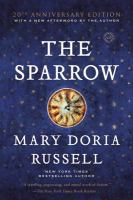Today the Matchmakers team welcomes guest blogger James Rogers, who leads the Pioneers of Sci-Fi Book Club! James writes:
I’m a big fan of Science Fiction, and by far my favorite Sci-Fi stories always have deep and well thought out world building. They not only detail the societies, ideas, and technologies of their fictional worlds, but also tie all of those elements into the story’s character arcs, motivations, and central themes. I run a Science Fiction book club at  the library, and we recently discussed a novel that worked for me on all of these levels.
the library, and we recently discussed a novel that worked for me on all of these levels.
The Sparrow, written by Mary Doria Russell (a local author!), follows the story of Father Emilio Sandoz. Father Sandoz is a Jesuit linguist who participates in the first contact mission to an alien planet. The chapters jump back and forth between introducing you to Emilio and those who follow him on this mission, and the journey’s tragic aftermath. He and his friends and loved ones who join him are all beautifully written, complete characters with complex personalities and motivations for deciding to take a leap of faith and join this trip to an alien world. Some are scientifically curious, some are looking to rekindle their faith, some are trying to repay a debt, some are guided by love, but they all are distinct personalities who bring unique talents and perspectives to the table. Despite knowing from the outset that most of these characters meet untimely ends, I found myself caring for each of them more and more, which brought a real sense of weight and consequence to the story.
Upon reaching this new planet, Russell’s talent for world building really shines through. From the party’s first contact and eventual assimilation into an alien society, it’s clear that this planet, from its ecology, inhabitants, culture, and evolutionary path, was thought through down to the smallest details. The aliens’ class structure, languages, values, familial units and even diets all make sense in the context of the broader story, and it’s a mysterious and exhilarating process to put all of the pieces together while reading. Seeing all of these elements operate so well in tandem always impresses me, but because they also interlock with the book’s themes of communication (or miscommunication), the importance and limitations of knowledge, and the families we make for ourselves, The Sparrow quickly became a personal classic.
At its heart, The Sparrow is a tragic story of love, faith, and forgiveness. Though a sorrowful read at times, I found it to ultimately be a fulfilling story and would highly recommend it to anyone who enjoys Science Fiction (and a good cry). If you want to read and discuss classics of the Sci-Fi genre, the Pioneers of Sci-Fi Book Club meets at our Lee Road library on the third Thursday of every month. If you’re looking for other books with similarly intricate world building, I’d also recommend:
The Left Hand of Darkness by Ursula K. Le Guin
Stories of Your Life and Others by Ted Chiang
The Fifth Season by N.K. Jemisin
Ancillary Justice by Ann Leckie
Hyperion by Dan Simmons
P.S. Check out The Sparrow’s Acknowledgments section for a shout out to our library’s Noble Road branch!
